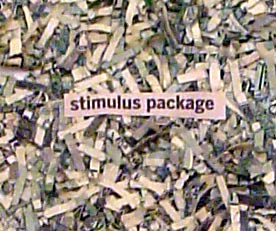
Like so many Americans who have money in the stock market, I try to stay up with financial news. I read books by Suze Orman. I frequent blogs like The Simple Dollar. I read the business section of the Trib, or even the Wall Street Journal on occasion, and listen to Marketplace on NPR, all the while pretending that I understand the jargon. Do I really know what zombie debt or lagging indicators or mortgage backed securities really are? Nope.
As an undergrad, I went to a school that is well-known for its economics program, though I never took a single college class on the subject. At the time I was still too burned out from having taken so many core cases that did not interest me, and was more than happy to get to the “good stuff:” the art / creative writing / film classes that I needed for my major. So all I learned about economics was from reading The Marx Engels Reader for a required humanities class. (Or was it a soc class?) Yet whether I fully understand it or not, I am an active participant in the economy. Even without my IRA, I still would be. But having a retirement fund means that even more is at stake. My perspective of what’s going on in the economy is a limited one. My recessionist pieces are a reaction to how I feel about how the economy affects me personally.
Several months ago, pre-crisis, I became fascinated with the talk of the stimulus package, and was also intrigued by the way no one wanted to say the dreaded “r” word. It is a word that people (other than Suze Orman) still are reluctant to say. Call it a meltdown, call it a crisis, call it anything but a recession. All I know is that it has definitely felt like a recession to me, and to many of my friends. You see, most of us are underemployed. For the past eight years, I’ve been stuck in a financial rut. I have yet to reap the benefits of our so-called “new economy.” Maybe the analysts were all too comfortable enjoying the trappings of upper-middle-class life to acknowledge the trials those like me have endured. Perhaps it is not officially a recession as long as people like them still have good jobs. Or perhaps it’s all in my head and I am just a whiner. Like I said before, I am not sure exactly how these things work.
So I thought, well we have expressionism, impressionism, secessionism, why not recessionism? I am painting the previously ignored 800 pound gorilla in the room. Or, rather, making collages about it.
It’s hard to believe that even after what happened last week the business journalists are still reluctant to use the “r” word! Speaking of last week, that really scared me. Let me re-post what I put on my Facebook wall so I don’t have to re-invent the wheel:
Is it time to party like it's 1929? They just interrupted Oprah to report on the things Bush is going to do to try to fix the economy, but is it too little too late? The last time I was watching Oprah and it got interrupted, it was because of Hurricane Katrina. I have never seen a program get preempted for business news before, so this scares me. Perhaps my friends who were Econ majors can explain the situation to me. In the meantime, I am submitting this video clip from Annie. These are the singing hobos from Hooverville.
The song goes,
We'd like to thank you, Herbert Hoover
For really showing us the way
We'd like to thank you, Herbert Hoover
You made us what we are today
but I like to sing it this way:
We'd like to thank you, Bush and Cheney
For really showing us the way
We'd like to thank you, Bush and Cheney
You made us what we are today
And as for the bailout, it can be hard to get your mind around a figure as immense as $700 billion. I’ve always learned better from things involving cartoons, Muppets, or at the very least, music. This is the video from Square One that taught me how big one billion is.
Now just multiply that by 700…

No comments:
Post a Comment